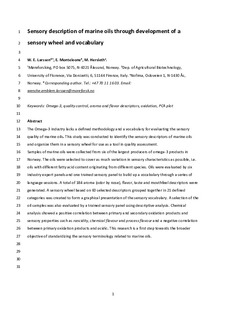Sensory description of marine oils through development of a sensory wheel and vocabulary
Peer reviewed, Journal article
Accepted version
Permanent lenke
http://hdl.handle.net/11250/2587105Utgivelsesdato
2018Metadata
Vis full innførselSamlinger
- Artikler / Articles [1449]
- Publikasjoner fra CRIStin [2518]
Sammendrag
The Omega-3 industry lacks a defined methodology and a vocabulary for evaluating the sensory quality of marine oils. This study was conducted to identify the sensory descriptors of marine oils and organize them in a sensory wheel for use as a tool in quality assessment. Samples of marine oils were collected from six of the largest producers of omega-3 products in Norway. The oils were selected to cover as much variation in sensory characteristics as possible, i.e. oils with different fatty acid content originating from different species. Oils were evaluated by six industry expert panels and one trained sensory panel to build up a vocabulary through a series of language sessions. A total of 184 aroma (odor by nose), flavor, taste and mouthfeel descriptors were generated. A sensory wheel based on 60 selected descriptors grouped together in 21 defined categories was created to form a graphical presentation of the sensory vocabulary. A selection of the oil samples was also evaluated by a trained sensory panel using descriptive analysis. Chemical analysis showed a positive correlation between primary and secondary oxidation products and sensory properties such as rancidity, chemical flavor and process flavor and a negative correlation between primary oxidation products and acidic. This research is a first step towards the broader objective of standardizing the sensory terminology related to marine oils.
